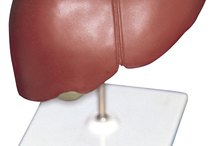What Are the Treatments for a Liver Cyst?
Liver cysts are small benign growths that occur on the surface of the liver and are typically filled with fluid. These cysts are often discovered incidentally because small liver cysts may not cause any symptoms and require no treatment. Cysts that do cause pain or discomfort may need to be treated, however, which can be done in a variety of ways.
Drainage
The simplest way to treat a liver cyst is to drain it, MayoClinic.com explains 2. Draining a liver cyst is a fairly straightforward procedure: a needle is inserted into the abdomen and the tip is guided into the cyst using ultrasound or other imaging techniques. Once the needle is in the cyst the fluid is drained, which causes the cyst to shrink. Making the cyst smaller can help reduce pain and discomfort.
- The simplest way to treat a liver cyst is to drain it, MayoClinic.com explains 2.
- Once the needle is in the cyst the fluid is drained, which causes the cyst to shrink.
Cyst Wall Removal
Signs & Symptoms of Liver Ulcers
Learn More
Although the draining of a liver cyst represents a relatively non-invasive approach to treating liver cysts, cysts that are treated with drainage can fill again with fluid, the University of Southern California's Surgery Department explains 4. If this is a concern, surgeons can remove part of the wall of the liver cyst. This will cause the fluid to drain out of the cyst into the abdominal cavity and will prevent the cyst from refilling. This procedure can be done laparoscopically, which means that small incisions and special tools are used to minimize the risk of infection and to speed healing time.
- Although the draining of a liver cyst represents a relatively non-invasive approach to treating liver cysts, cysts that are treated with drainage can fill again with fluid, the University of Southern California's Surgery Department explains 4.
- If this is a concern, surgeons can remove part of the wall of the liver cyst.
Liver Transplant
In severe cases, liver cysts can be caused by a condition known as polycystic liver disease, the Cleveland Clinic explains 1. This can result in multiple cysts appearing in the liver, causing it to resemble a cluster of grapes. Over time, polycystic liver disease can cause massive enlargement of the liver, resulting in extreme pain and discomfort. Polycystic liver disease can only be treated with a liver transplant, a risky and invasive operation that requires the lifelong use of medications which suppress the immune system in order to keep the body from rejecting the transplanted organ.
- In severe cases, liver cysts can be caused by a condition known as polycystic liver disease, the Cleveland Clinic explains 1.
- Over time, polycystic liver disease can cause massive enlargement of the liver, resulting in extreme pain and discomfort.
Echinococcus Treatment
Causes of Liver Cysts
Learn More
In some cases a liver cyst is caused by an infection from the Echinococcus granulosus or Echinococcus multilocularis forms of tapeworm, MedlinePlus explains 3. These parasites can cause cysts throughout the body and have a tendency to infect the liver and form cysts there. These worms can be treated using mebendazole or albendazole, two medications which are effective against this kind of parasite. The liver cysts can also be surgically removed, but before the cyst can be cut into it must first be injected with alcohol, as the cyst is filled with parasites. If this is not done and the cyst ruptures, a massive quantity of worms will be released into the abdominal cavity, resulting in a life-threatening infection.
- In some cases a liver cyst is caused by an infection from the Echinococcus granulosus or Echinococcus multilocularis forms of tapeworm, MedlinePlus explains 3.
- The liver cysts can also be surgically removed, but before the cyst can be cut into it must first be injected with alcohol, as the cyst is filled with parasites.
Related Articles
References
- Cleveland Clinic: Liver Cysts
- MayoClinic.com: Liver Cysts
- MedlinePlus: Echinococcus
- National Cancer Institute. Cyst.
- Cleveland Clinic. Conditions which can be mistaken for tumors.
- Harvard Health. Cysts (overview). 2020.
- Zito PM, Scharf R. Epidermoid cyst (sebaceous cyst). StatPearls. Updated August 11, 2020.
- American Society for Surgery of the Hand. Ganglion cyst. Updated 2018.
- Frush TJ, Noyes FR. Baker's cyst: Diagnostic and surgical considerations. Sports Health. 2015;7(4):359-365. doi:10.1177/1941738113520130
- Office on Women's Health. Ovarian cysts. Updated April 1, 2019.
- American Cancer Society. Fibrosis and simple cysts in the breast. Updated September 10, 2019.
- Cleveland Clinic. Breast cysts: Management and treatment. Updated August 24, 2020.
- Díaz de la Noval B, García Fernández I, Álvarez Fernández B. Bulky Bartholin's gland cyst: Case report of an incidental finding. Case Rep Womens Health. 2019;22:e00115. doi:10.1016/j.crwh.2019.e00115
Writer Bio
Adam Cloe has been published in various scientific journals, including the "Journal of Biochemistry." He is currently a pathology resident at the University of Chicago. Cloe holds a Bachelor of Arts in biochemistry from Boston University, a M.D. from the University of Chicago and a Ph.D. in pathology from the University of Chicago.








